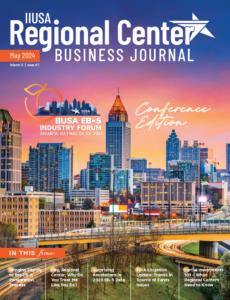Earlier this week, IIUSA submitted a letter to the U.S. Citizenship and Immigration Services (USCIS) after the agency hosted a listening session related to the EB-5 Reform and Integrity Act of 2022 (“RIA”) on April 29, 2022.
In the letter, the association emphasizes the disastrous impact of USCIS’s latest interpretation of RIA by requiring the approval of the new Form I-956 before a regional center can be re-designated and to resume promoting economic growth. Before the listening session, IIUSA already submitted a letter to USCIS, requesting a meeting with the agency to discuss the interpretation of RIA, outlining the potential consequences of requiring regional center re-designation and providing a proposed solution for the agency’s consideration.
Additionally, IIUSA also urges USCIS to open a working dialogue with the EB-5 stakeholder community as these conversations are necessary and consistent with RIA section 107 that requires the U.S. Department of Homeland Security to be impartial and report communications.
As the representative of the EB-5 industry, IIUSA stays committed to working with USCIS on this critical matter and looks forward to a meaningful dialogue with the agency.
The Honorable Alejandro Mayorkas
Secretary of Homeland Security
2703 Martin Luther King Jr. Ave.,
SE, Washington, DC 20593
Ur Mendoza Jaddou, Director
U.S. Citizenship and Immigration Services
5900 Capital Gateway Drive
Camp Springs, Maryland 20588
Alissa Emmel, Chief
Immigrant Investor Program Office
U.S. Citizenship and Immigration Services
131 M Street, Northeast
Washington, DC 20529
RE: April 29, 2022 Listening Session and Internet Posting, EB-5 Questions and Answers
Dear Secretary Mayorkas, Director Jaddou, and Chief Emmel:
I write in profound disappointment regarding the events of April 29, 2022, involving unworkable interpretations of the EB-5 Reform and Integrity Act of 2022 (“RIA”). These events vividly show the need for a working dialogue between USCIS and the EB-5 stakeholder community. Such dialogues are necessary and can be consistent with RIA section 107’s transparency requirements.
The announcement made via an internet posting, EB-5 Questions and Answers (“Q&A”),1 was disturbing in both content and manner of dissemination. IIUSA had requested by letter dated April 18, 2022 that should USCIS interpret RIA as requiring regional center redesignation, such redesignation be accomplished by an attestation rather than a filing requiring adjudication. This proposal, based on the annual regional center certification precedent, would allow regional centers to resume promoting economic growth and job creation as soon as possible while maintaining USCIS’s authority to terminate non-compliant regional centers. Given the 4 to 6-year USCIS reported processing times for EB-5 filings, requiring approval before regional centers may defer regional center reauthorization beyond Regional Center Program expiration in 2027. This absurd result would stand RIA on its head.
Yet, the Q&A announced just that, requiring the approval of the new Form I-956 before regional centers will be redesignated. No indication of the new form’s required contents nor expected adjudication timeframes accompanied this potential existential calamity for the existing compliant regional centers seeking to continue business. IIUSA grants that if the Form I-956 is reasonable in content with a guaranteed and expedited adjudication timeframe, our concerns would be happily misplaced. However, nothing in either the Q&A or the Listening Session held later displaced these fears.
In fact, the Listening Session set the backdrop of millions of filings remaining in the overall USCIS backlog and no plan for expeditious EB-5 adjudications. The Listening Session thus proved to be the second distressing event of April 29, 2022.
These events make clear that substantive communication with stakeholders held in advance is critical. This meaningful, working dialogue may be held consistent with RIA section 107 requiring transparency (“Section 107”). Section 107 essentially requires the U.S. Department of Homeland Security to be impartial and report communications. While case-specific or case-related communications must follow delineated channels of communication, these guardrails do not apply to communications not involving cases. In other words, substantive engagements regarding global issues related to implementing the new law would not run afoul of Section 107.
A precedent exists for this sort of working dialogue. As USCIS Director, Secretary Mayorkas held “Conversations with the Director,” open to the public, to probe complex EB-5 issues. Similarly, under then-Director Mayorkas’ leadership, USCIS initiated an iterative process of drafting a comprehensive EB-5 policy memorandum involving substantive stakeholder feedback. Stakeholders did not “win” all points of advocacy, but had the opportunity to provide scholarly gloss and real-world impacts in a substantive exchange with USCIS. These efforts culminated in the universally lauded 2013 comprehensive USCIS EB-5 policy memorandum.2 The 2013 USCIS memorandum provided adjudicators and stakeholders with authoritative guidance that truly modernized the EB-5 program and enabled its growth.
It is evident that after the passage of a 100-page new law concerning the most complex area of U.S. immigration, convening such working dialogues would be most appropriate and, we respectfully submit, necessary.
We sincerely believe that it is in the interest of the agencies administering the new EB-5 program, the industry, and investors for this dialogue to begin immediately. We offer all our expertise at your disposal for a favorable answer to our request.
Respectfully,

Aaron L. Grau,
Executive Director Invest in the USA








